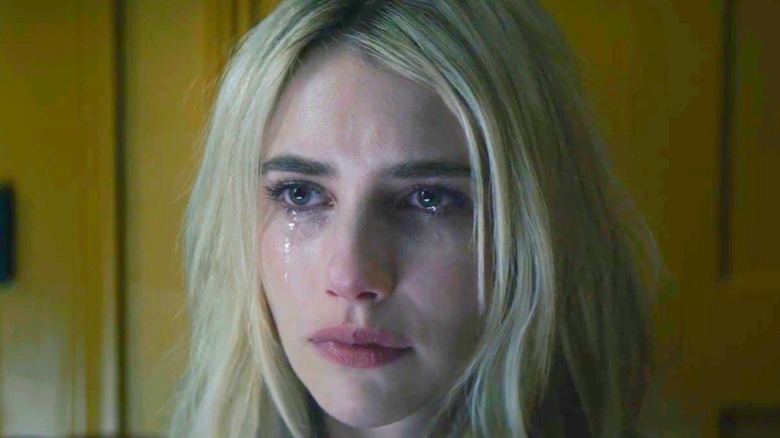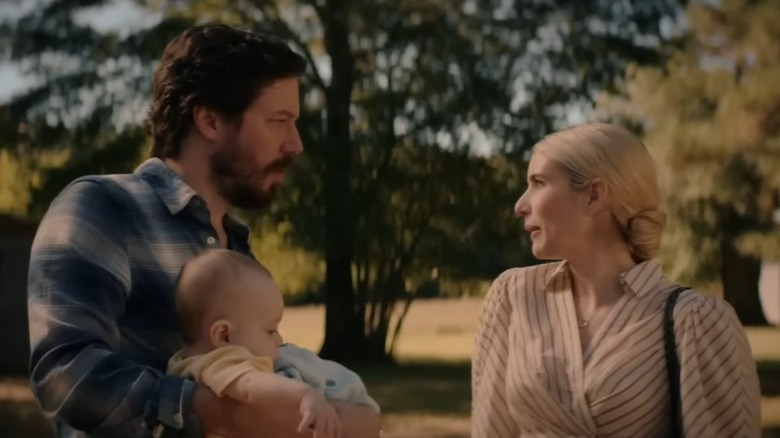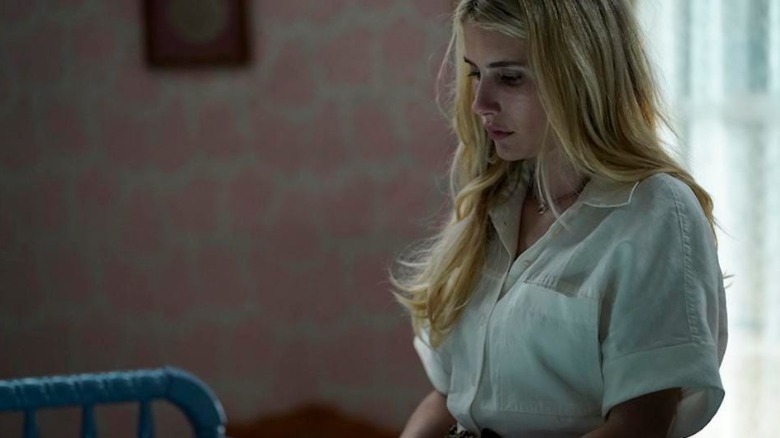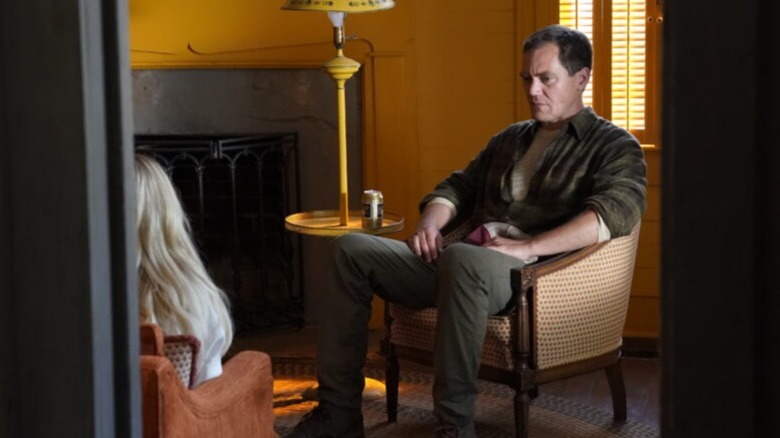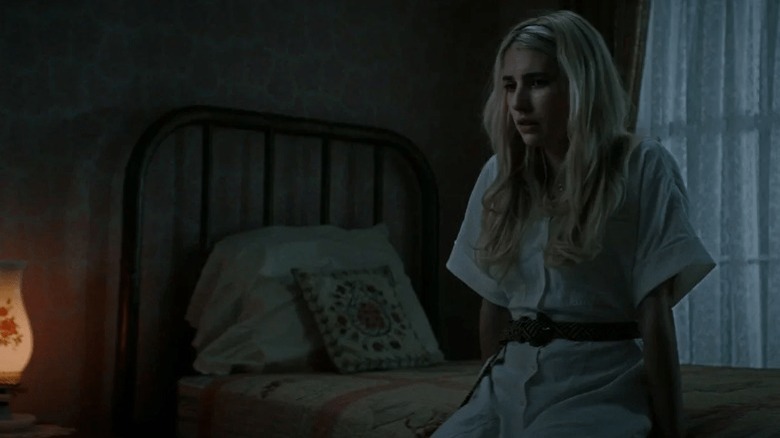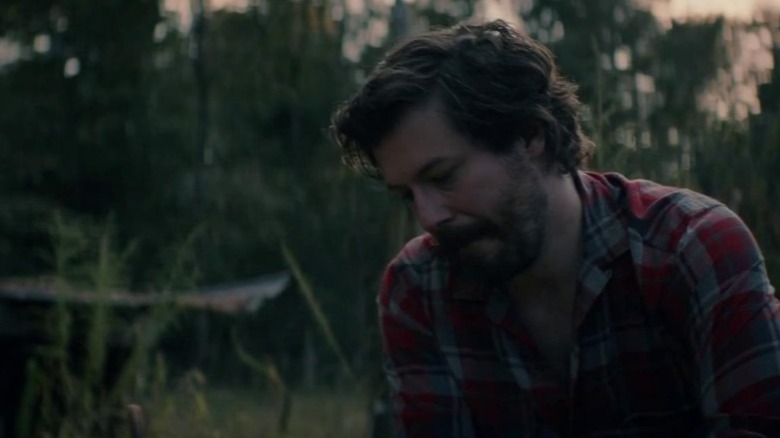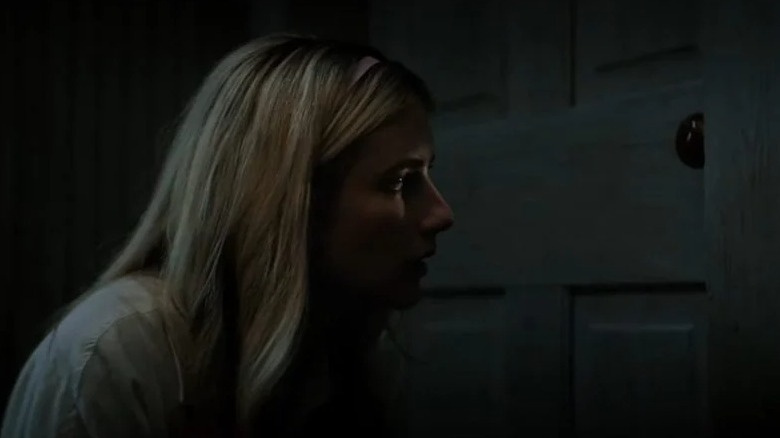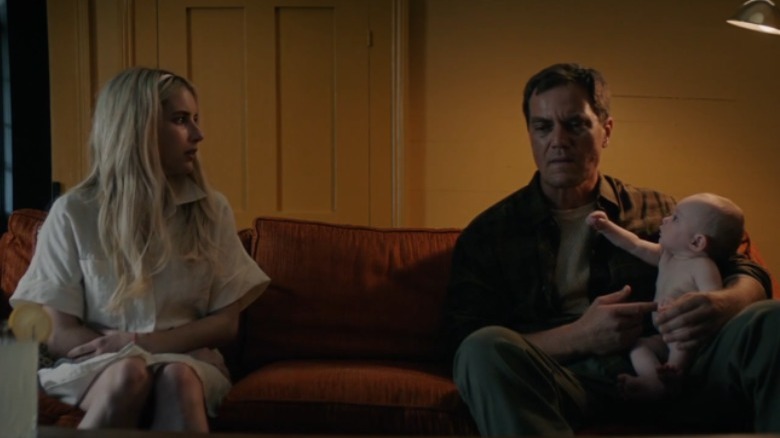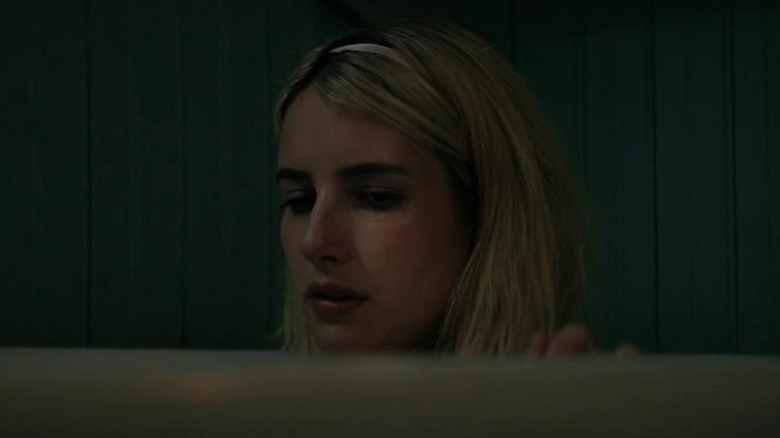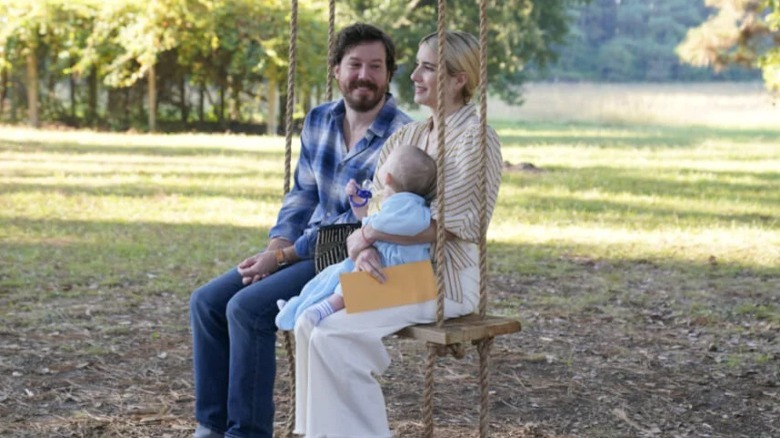The Ending Of Abandoned Explained
We may receive a commission on purchases made from links.
Sara (Emma Roberts) isn't afraid of ghosts — yet — when we first meet her in "Abandoned." "You know, I don't mind a little haunting," she says, after agreeing to purchase a big, beautiful home with a sordid history out in the rural countryside. Despite the implied confidence, those are some mighty famous last words. "Abandoned" is a horror film that dabbles in hefty themes including postpartum depression, mental illness, and abuse. Sara and her husband Alex (John Gallagher Jr.) are moving from the big city with their newborn Liam (Marie May) in hopes of starting a new life away from the commotion of urban living. After finding the home they wish to settle into, the realtor reveals a horrific event that occurred 40 years ago in the home. Despite the grisly nature of the home's distant past, Sara and Alex move forward with the purchase setting their focus on the future of their family.
At times, "Abandoned" plays out more as a psychological drama than purely horror. Though, that doesn't mean the film doesn't have its share of disturbing sequences. However, Sara's journey into motherhood is, perhaps, one many new mothers can relate to who suffer from the effects of postpartum depression. She's grappling with the idea that her feelings toward her son and the idea that she is a mother aren't in line with what she had expected. The inner conflict she's struggling with only heightens her anxieties and interest in finding out what happened to the family that lived in the home four decades ago. The film walks a shaky line between an actual haunting by the spirits of the past and Sara's psychosis that's a result of her deep depression. As such, some may find the ending resolution a bit confounding.
The following article includes discussions of suicide, domestic abuse, sexual assault, and postpartum depression.
A distant relationship
Not everything is peaches and gravy in the new life of parenthood. From the get-go, we see Sara and Alex attempting to view the home they ultimately will purchase while their son Liam inconsolably cries. It's clear that the new parents — particularly Sara — are a bit frustrated over Liam's colicky nature. What might not be entirely apparent, however, is that there's clearly already a divide between Sara and her husband, even if they don't want to acknowledge it. The film is pretty plain regarding Sara's postpartum depression. And there's already a sense that she has been suffering from it long before we meet the characters at the start of the movie. It seems likely that her struggle was also a catalyst for the couple to move into a new home.
When Alex speaks to the realtor, he constantly refers to himself singularly before correcting his language using the word "we." It's a Freudian slip that clues the audience into the idea that Sara is rather distant and Alex feels that he's the only one steering the boat, so to speak. She's quiet and doesn't say much until it's time to actually make a decision. When Alex heads into the house to sign the paperwork with the realtor, he unloads a bit as he shares that city life hasn't "been good" for the couple — at least, not since the baby was born. That's the first major indicator something has put a wedge between the couple that only deepens as time progresses. Of course, the realtor could care less about any of Alex's ramblings motioning to him to keep signing as he's talking.
The cold reality of postpartum depression
Throughout the film, Sara struggles to bond with her son. She often feels that his constant crying and refusal to nurse are a sign that they don't have a connection. Sara often appears sullen in her interactions with her husband and is usually distant seemingly living in her own head. Her fixation on the murders that took place in her newly purchased home indicates her need to distract herself from her own struggles.
One detail that viewers may not initially notice is her lack of self-care. Most forms of depression often cause those afflicted to lose sight of their own needs. Throughout the course of the film, multiple days pass, yet Sara doesn't even change her clothes. She's even seen going to sleep in her day clothes. Typical hygienic routines are neglected. Additionally, she's entirely closed off. She isn't open with her husband about the things she's witnessed, whether they be related to her own psychosis or actual spirits. Sara also wears a rubber band on her wrist and often snaps it when she's over-stimulated or feeling anxious. This coping mechanism is often employed by those who are struggling with depression or anxiety to keep them grounded. Some use it as a method of conditioning themselves to refrain from negative thoughts or habits. When Sara is scared or finds herself over-encumbered by her thoughts and surroundings, it's a tool she uses to help her stay calm.
If you or someone you know needs help with mental health, please contact the Crisis Text Line by texting HOME to 741741, call the National Alliance on Mental Illness helpline at 1-800-950-NAMI (6264), or visit the National Institute of Mental Health website.
A history of horrors and bloodshed
"Well, it's gonna sound worse than it was," the realtor says as she prepares to unload the awful truth behind the home's history. As the truth is unveiled, that line the realtor fed the couple is a total crock. Double homicide is exactly as horrible as it sounds. Initially, the realtor shares that a young girl murdered her infant and her father before ending her own life. Once the strange neighbor Renner (Michael Shannon) enters the couple's lives, he expounds on the horrifying details. The patriarch, Robert Solomon (Justin Matthew Smith) sexually assaulted his own daughter Anna (Addy Miller) on multiple occasions following the death of his wife. Renner reveals that Anna had a brother and their mother died after complications with childbirth. Renner shares that the boy was blamed for his mother's death.
The realtor later informs Sara that Renner is actually Anna's still-living brother. That seems like a detail she should have divulged when selling the home. Renner changed his name and moved close to home to grieve in solitude. Sara asks Renner if there were other babies. In a strange twist, he reveals there were actually three babies. Confused, Sara asks why the other two weren't in the reports. But then the unsettling realization comes to mind that they still remain inside the home. Sara comes to believe that they're hiding behind the wardrobe and that the boys have been stealing their possessions.
If you or anyone you know is having suicidal thoughts, please call the National Suicide Prevention Lifeline by dialing 988 or by calling 1-800-273-TALK (8255).
If you or anyone you know has been a victim of sexual assault, help is available. Visit the Rape, Abuse & Incest National Network website or contact RAINN's National Helpline at 1-800-656-HOPE (4673).
If you or someone you know may be the victim of child abuse, please contact the Childhelp National Child Abuse Hotline at 1-800-4-A-Child (1-800-422-4453) or contact their live chat services.
Sara's feelings toward her infant son
Perhaps one of the most unsettling aspects of the entire film is Liam's constant crying and Sara's inability to console him. It compounds the feelings of unease regarding the inner turmoil Sara suffers from alongside the surreal nature of her hallucinations. She often mistakenly displays a degree of neglect as she's roped into her own hallucinogenic psychosis — a condition that is later revealed to be a primary cause of her struggles, according to her doctor. This leads us to wonder why Liam refuses to bond with his mother.
When Alex later calls in someone to help treat Sara, she shares her current state of mind, saying, "Everybody told me how euphoric this would all be. How I was gonna feel love I'd never felt before. I don't feel any of that. And I'm embarrassed. Then I look at him and I feel guilty and resentful and sad." Sara desperately wants the feelings she was promised, but they continually escape her. She refuses medication so that she can continue to breastfeed — the only thing, she believes, that creates some sort of connection between her and Liam. Ultimately, the doctor recommends that she take an anti-psychotic, but she does not.
If you or someone you know needs help with mental health, please contact the Crisis Text Line by texting HOME to 741741, call the National Alliance on Mental Illness helpline at 1-800-950-NAMI (6264), or visit the National Institute of Mental Health website.
The case of the sick pigs
Alex doesn't get a lot of attention in this film, but he does have one minor plot thread. As a veterinarian living in a rural area, he has to travel to each of his clients in order to assess the health of their livestock and other animals. This, of course, leaves plenty of time for Sara to be alone with her thoughts and Liam. In one particular instance, he is attempting to diagnose a problem with one farmer's newest litter of pigs. In order to run tests, Alex suggests that the father of the pigs will have to be tested which would require euthanizing.
After running some tests on the deceased father, Alex reports back to the farmer that the mother is unfortunately the infected culprit. This, then, requires that the litters and mother are terminated in order to not cause further spreading of the infection. Alex offers the farmer two choices: a bolt gun or an injection. Alex, being the animal lover that he is tries to sway the farmer to the more humane method of injection even offering to cover the additional cost. But the farmer insists, for whatever reason, that he use the bolt gun. This moment seems to have a great effect on Alex, mostly because of the parallel that can be drawn between the pigs' circumstances and is home life. He becomes more embittered toward Sara because of the strain her mental struggle is putting on the family. He now sees as it a possible infection spreading through his family, much like the situation with the mother pig and her own offspring. This increases his insistence on Sara seeking treatment.
Renner's trauma
From the moment we meet Renner, it's easy to understand that there is a lot bubbling beneath his uneasy, yet quiet surface. Michael Shannon does an admirable job of conveying a trauma that has long festered deep within Renner's psyche. What's ultimately been left behind is a man devoid of happiness who seems to live in a state of perpetual grief. This is understandable considering all that he went through. He suffered guilt from being accused of causing his own mother's death. The level of psychological damage that could cause a young boy is incalculable. Then he endured the heinous actions of his father toward his sister and was left alone as the sole survivor in the resulting violent aftermath.
Renner states that he moved close to his childhood home in his adulthood simply so he could grieve in his own way. He mentions offhand that he couldn't afford to buy the house, or else he would have. He changed his name so that his identity as the boy who survived would be concealed from the locals. However, the name change didn't fool anyone. The realtor states that everyone has always known that Renner was Anna's brother. But it's through Renner's trauma that Sara is able to come to a resolution with her own son. Anna never had any say in what happened to her. Everything was forced upon her by her abusive father. In her eyes, her children weren't hers but were painful reminders of what her father took from her. Sara, on the hand, eventually realizes that Liam is hers. "You are mine," she says when she is threatened with the idea that he could ever be taken from her.
Mental health and medication
Whether you truly believe that hauntings are occurring or it's all in Sara's head is irrelevant when it comes to one absolute fact: Sara has severe postpartum depression. There isn't any doubt that this is the case and her therapist, Dr. Carver (Paul Schnieder) diagnoses her as such. Carver even briefly touches on her rubber band, which he (correctly) assumes is a coping method provided to her by her previous therapist prior to the big move. Based on Sara's reported actions, such as mistakenly leaving her son at the top of a flight of stairs, Carver believes that Sara's depression has morphed into hallucinogenic psychosis. He prescribes her anti-psychotics to help her cope with the images or sounds that she may be experiencing.
Of course, as we've previously indicated, Sara rejects the medication. She insists on being able to breastfeed and realizes that medication would end the time she shares with her son. Sara believes it's the only moment in which she feels close to him. However, there is a real commentary here regarding the necessity of modern medicine. In the closing moments of the film, despite the "happy" setting, we still get the sense that Sara's struggle never entirely went away. While confronting her feelings is key, mental illness is a constant battle that requires self-care. Sara's refusal to take the medication and confront her feelings (until the third act) is the very reason the entire sequence of events in this film even occurs.
If you or someone you know needs help with mental health, please contact the Crisis Text Line by texting HOME to 741741, call the National Alliance on Mental Illness helpline at 1-800-950-NAMI (6264), or visit the National Institute of Mental Health website.
Haunting or hallucinations?
That leads us to the biggest question of the film. Is the home truly haunted, or is everything seen through the lens of Sara's psychosis? Ultimately, the film is centered around Sara's depression. The horror is merely a backdrop that complements her feelings as a mother. There is a reason that Alex didn't want the realtor to divulge any of the tragic events that occurred in the home. He knew that Sara, in her state, would fixate on it. And she does. She often sees ghostly images of Robert Solomon, the abuser in this situation. At the same time, she is crippled with her own guilt of inadequacy as a mother. She's in completely new territory, physically and emotionally, and Sara feels like she isn't attached to her son in the way that she's supposed to be. The primary giveaway that this story is purely based on Sara's own mind is that Alex never experiences any of the alleged hauntings.
Sara sees more apparitions as she learns more about what occurred. Her mental state has created a haunting within her mind as a manifestation of her own turmoil. The idea that Sara looks nearly identical to Anna has allowed her mind to slip into the horrific scenario with ease. She becomes so enraptured by the events playing out in front of her that she believes what she is seeing is real. In fact, the moment Renner indicates that the other two baby boys were still in the home, she instantly makes her own connection that the boys are still alive and causing all the noise she heard behind the wardrobe. However, Renner was implying that his father murdered them and covered them up within the home. These ghostly visions are all a hallucination.
Confronting Sara's feelings
In the final moments of the film, Liam is seemingly taken from Sara, and she chases a small child into the room where a wardrobe once covered a passage. Upon entering the room, she sees the wardrobe has a gaping hole in the back of it that leads into a crawl space. She finds that all of the items that have gone missing including a toy truck and Alex and Sara's wedding photo are sitting in this space. Then two feral boys emerge that represent the two additional babies that Renner spoke of. One is holding baby Liam. These boys are clearly figments of Sara's mind as there is no way they could possibly be alive. The tragedy occurred 40 years ago, so they'd be fully grown adults if they somehow managed to survive living in the crawlspace all these years.
Sara tells them that she knows who they are and what Robert did to them. She asserts that she is nothing like him, but the boy holding Liam retorts that she is and that he's seen Sara hurt "him." Of course, he's referring to Liam. Sara painfully rejects the notion that she would hurt or neglect her child willfully. The boys then threaten to end the child's life with a hatchet. The screen then goes blank, and Sara emerges with Liam. With a renewed outlook on motherhood, Sara tearfully proclaims that "he's mine." Of course, this sequence was simply Sara's own subconscious indicting her over her perceived neglect of her child. After she comes to the happy resolution that she is adequate and Liam is her baby boy, emotionally speaking, we can also see that the truck and picture are absent from the crawlspace as if they were never there.
Happily ever....
Following this emotional breakthrough, Alex returns home in a hurry with concern that he has been away for too long. He sees that Sara has made breakfast and she assures him that "it's over." She's overcome her feelings of hopelessness and emptiness toward her son and has found a renewed sense of purpose in motherhood. The final minutes of the film depicts Sara and Alex living their best life as a happy couple raising young Liam who has now grown into a toddler.
Out in the yard, we see that Renner has become a close family friend with the pair and is tossing a baseball as if he just got done playing catch with young Liam. Sara and Alex then join Liam on the big tree swing. As they sway back and forth, Sara appears to have an uneasy look overcome her. In the final shot, we can quickly see that she is resting her arm on her pregnant belly, likely concerned that it will all start over once again with the birth of her second child. The truth of the matter is that there never is any simple cure for mental illness, especially depression. But there are treatment and coping methods available to help those who deal with such struggles to live the best quality of life and mitigate their symptoms.
If you or someone you know needs help with mental health, please contact the Crisis Text Line by texting HOME to 741741, call the National Alliance on Mental Illness helpline at 1-800-950-NAMI (6264), or visit the National Institute of Mental Health website.
